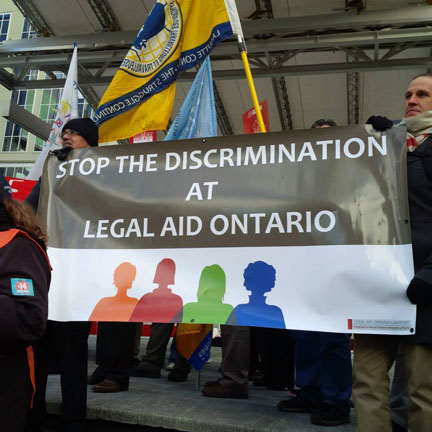One full year after its initial proposal, the union organizers for legal aid lawyers in Ontario finally got their man.

Ten organizing committee members of
LAO Lawyers met face to face for the first time with Legal Aid Ontario chief executive Bob Ward yesterday.
The group had, in early 2013, sent a letter to Ward proposing representation by the Society of Energy Professionals union. Ward responded with a letter in October, rejecting the proposing and suggesting representation by a trade union would be unprecedented and unacceptable.
Then, a serendipitous break — at a legal event in January, Ward bumped into Jillian Rogin, one of the committee members.
“We got into a discussion about why he’s not willing to recognize the society as our representative,” Rogin tells Legal Feeds. “And at that time he said, ‘Well, we’re not going to discuss this here. Why doesn’t your group come in and meet with me and discuss the issue further?’”
Far from producing any concessions, however, the meeting ground to an impasse fairly early on. It lasted just under an hour.
“He did not answer the question. He said it was his ‘right and privilege’ as the employer to deny this. That was the answer that we got,” she says. “He indicated that he’s firm on this and he’s not going to change his perspective — and, you know, there’s only a limited space you can go from there.”
LAO spokesperson Kristian Justesen says the purpose of the meeting was to discuss the creation of a formalized system through which workplace concerns can be addressed.
“Unfortunately, those from the organizing committee who attended the meeting refused to discuss any form of relationships other than what they proposed,” he says.
Justesen adds the Ontario Labour Relations Act does not apply to lawyers. Moreover, he says, LAO is not required to recognize any trade union acting as representation.
“LAO supports formalized means through which issues can be addressed. There are models, other than a trade union, to address workplace concerns.”
Rogin does not dispute the provisions of the act. However, she does take exception with the reasoning behind Ward’s original rejection of the proposal — that lawyers in Canada are not, and should not, be represented by trade unions.
Legal aid lawyers in Saskatchewan, for instance, are represented by CUPE Local 1949, she says. And lawyers working for the Ontario Nurses Association are represented by Service Employees International Union.
Rogin also says she finds it “condescending” and “paternalistic” that an employer would presume to have a veto over acceptable labour representation.
“We take great issue with an employer saying we will only talk to you if we get to dictate the terms of who you’re represented by. It’s very, very offensive.”
Strike action, she says, is not looming by any means, but the group has staged numerous rallies and has picked up support from various organizations.
The Association of Justice Counsel, which bargains on behalf of federal Crown counsel, has lent its support, with AJC president Lisa Blais writing directly to Premier Kathleen Wynne on the issue. The group has also worked closely with the Criminal Law Association, putting forth a joint proposal that would make it easier for low-income Ontarians to hire counsel.
“The number of legal aid lawyers that want to participate directly in organizing on this issue grows every day,” says Rogin. “Soon it will be a situation where the entire legal aid lawyer population is on the organizing committee — so, I mean, we’re just going to keep growing.”

 Ten organizing committee members of LAO Lawyers met face to face for the first time with Legal Aid Ontario chief executive Bob Ward yesterday.
Ten organizing committee members of LAO Lawyers met face to face for the first time with Legal Aid Ontario chief executive Bob Ward yesterday.